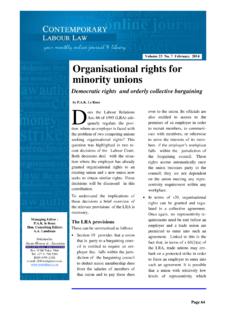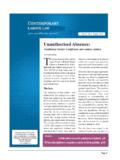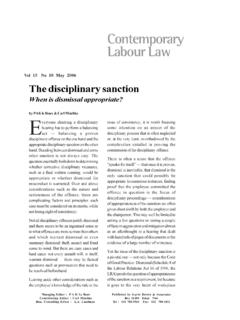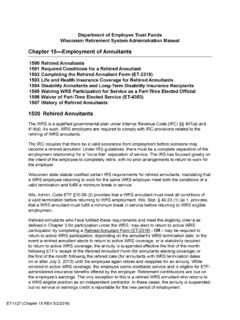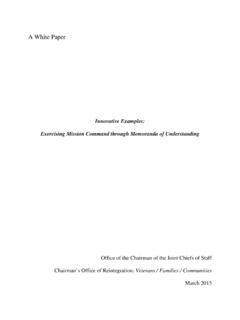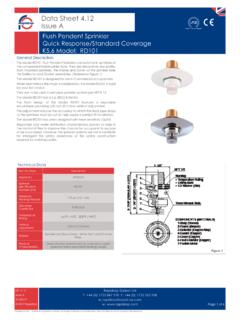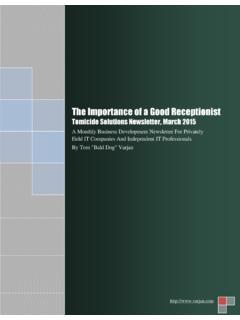Transcription of Contemporary Labour Law - workplace.co.za
1 Contemporary Labour Law Vol 15 No 3 October 2005. Calculating compensation for unfair dismissal Quantifying just and equitable compensation by Carl Mischke W. hile reinstatement and re- A wide discretion employment continue to head Remedies for a dismissal found to have been the list of remedies for unfair unfair are provided for in s 193 of the dismissal, a significant number of awards Labour Relations Act 66 of 1995 (the LRA). provide for compensation to be awarded to an unfairly dismissed employee. Very and s 194, amended in 2002, relates to the often, an award of compensation is the amount of compensation.
2 The effect of remedy preferred by the dismissed s193(1) can be summarised as follows: if a employee. dismissal is found to be unfair, the Labour Court, a CCMA commissioner or an The reported arbitration awards suggest that arbitrator may order . compensation is more popular than the reinstatement of an employee reinstatement, as employees often prefer to from any date not earlier than the take the money instead of having to return to a work situation which may be tense, to date of his or her dismissal;. say the least. This is most typically so in cases the re-employment of an employee of constructive dismissal where the from any date not earlier than the employment relationship has broken down date of the employee's dismissal; or to an extent where neither the employer nor the employee are prepared to resume a the payment of compensation.
3 Working relationship. The payment of compensation is seen as Despite the fact that compensation is the third remedy an alternative remedy awarded fairly regularly, it is clear from the for an unfair dismissal. According to s 193(2). awards and judgements that there has been reinstatement or re-employment are the very little attempt to formulate principles as preferred remedies and these are the to how the compensation to be paid should remedies that must be granted except where be determined. This contribution will review one of the following four circumstances are the decisions and awards dealing with this present - issue.
4 Managing Editor : P A K Le Roux Published by Gavin Brown & Associates Contributing Editor : Carl Mischke Box 31380 Tokai 7966. Hon. Consulting Editor : Landman Tel : 021 788-5560 Fax: 021 788-1811. Contemporary Labour Law Vol 15 No 3 October 2005. The employee does not wish to be reinstated their right to reinstatement or re-employment. If the or re-employed. employer's business depends on a positive public image, an employee engaging in high-profile mud-slinging . The circumstances of the dismissal are such may himself or herself make a resumption of the that a continued employment relationship would employment relationship impossible.
5 Be intolerable. It is not reasonably practicable for the employer The mere allegation that the employment relationship to reinstate or re-employ the employee. has broken down and that continued employment is no longer feasible will not be sufficient. In Kroukam v The dismissal is unfair only because the SA Airlink (Pty) Ltd (above) the employee alleged employer did not follow a fair pre-dismissal that his dismissal was automatically unfair because, as procedure. far as he was concerned, he had been dismissed for As confirmed in the recent decision of the Labour his activities as a trade union member.
6 The employer's Appeal Court (Kroukam v SA Airlink (Pty) Ltd case was that the dismissal had nothing to do with his (unreported: JA3/2003)), in the absence of any one of trade union activities, but that it related solely to the these factors, reinstatement or re-employment are misconduct (gross insubordination and being a the only competent remedies a court or an arbitrator disruptive influence on the orderly operation of the has no discretion in this regard. employer) with which he had been charged and found guilty. After an excruciatingly detailed analysis of the The effect of these provisions is that an employee may facts and the events leading to the dismissal, the Court indicate a choice whether or not to be reinstated (or concluded that the principal or dominant reason for re-employed) or whether he or she would prefer the employee's dismissal was that the employer was compensation.
7 The circumstances of the dismissal may not happy with the role that he was playing in also be decisive in deciding whether compensation is representing the interests of the union and its members, preferable. In this regard, it is not only the including his role in bringing an interdict application and circumstances of the dismissal as seen from the other legal proceedings on behalf of the union the employee's point of view that are relevant. The dismissal was therefore automatically unfair. The employer's view of events may also be decisive : once employer argued that reinstatement would not be the trust relationship between the employer and the appropriate, but the Labour Appeal Court found employee has been irreparably damaged (for example otherwise and reinstated the employee.)
8 In the case of fraud, dishonesty or theft), reinstatement or re-employment may not be appropriate. In The amended s 194 of the LRA reads as follows: Malelane Toyota v CCMA [1999] 6 BLLR 555 (1) The compensation awarded to an (LC) the Labour Court held that an award reinstating employee whose dismissal is found to be unfair an employee could not stand in the context of a either because the employer did not prove that disciplinary offence relating to dishonesty. the reason for dismissal was a fair reason relating to the employee's conduct or capacity The circumstances in which the employment or the employer's operational requirements or relationship terminates may also render reinstatement the employer did not follow a fair procedure, or re-employment inappropriate.
9 In Buthelezi v or both, must be just and equitable in all the Amalgamated Beverage Industries [1999] 9 circumstances, but may not be more than the equivalent of 12 months' remuneration BLLR 907 (LC) the employee's dismissal was aired calculated at the employee's rate of in newspaper articles, and the Labour Court came to remuneration on the date of dismissal. the conclusion that these articles, going out of their (2) .. [deleted]. way to soil the employer's public image, showed the (3) The compensation awarded to an active and willing participation by the employee. The employee whose dismissal is automatically Court held that while employees have a right to freely unfair must be just and equitable in all the express their grievances against their employers in the circumstances, but not more than the press, their doing so entails the risk of them forfeiting equivalent of 24 months' remuneration Page 22.
10 Contemporary Labour Law Vol 15 No 3 October 2005. calculated at the employee's rate of a platform, has been collapsed into a general remuneration on the date of dismissal. discretion to award compensation in an (4) The compensation awarded to an amount which is just and equitable in all the employee in respect of an unfair Labour circumstances. The need to exercise a practice must be just and equitable in all the discretion to award all or nothing, as regards circumstances, but not more than the procedural irregularities, which were equivalent of 12 months' remuneration. sanctioned in Johnson & Johnson (Pty) Ltd v Chemical Workers Industrial Union (1999) 20.

